PSY6038 Fundamentals: Field Observation of Self-Recognition in Child
VerifiedAdded on 2023/06/09
|7
|2798
|74
Practical Assignment
AI Summary
This assignment presents a field observation study focused on self-recognition in a 17.5-month-old child, utilizing the mirror test to assess cognitive development. The study investigates how Theory of Mind (ToM) can be used to determine development within a child. The observation was conducted in a home setting, where the child's interaction with her mirror image was recorded, including an assessment of her reaction to a mark on her forehead. The analysis incorporates various developmental psychology theories, including Kohlberg's stages of moral development, Erikson's psychosocial stages, and attachment theory. The study highlights the child's developing cognitive abilities, her ability to share joint attention, and her emotional responses, providing insights into her developmental progress. The observation is structured around ToM tasks, with focus on the child's ability to notice changes and recognize her own reflection.
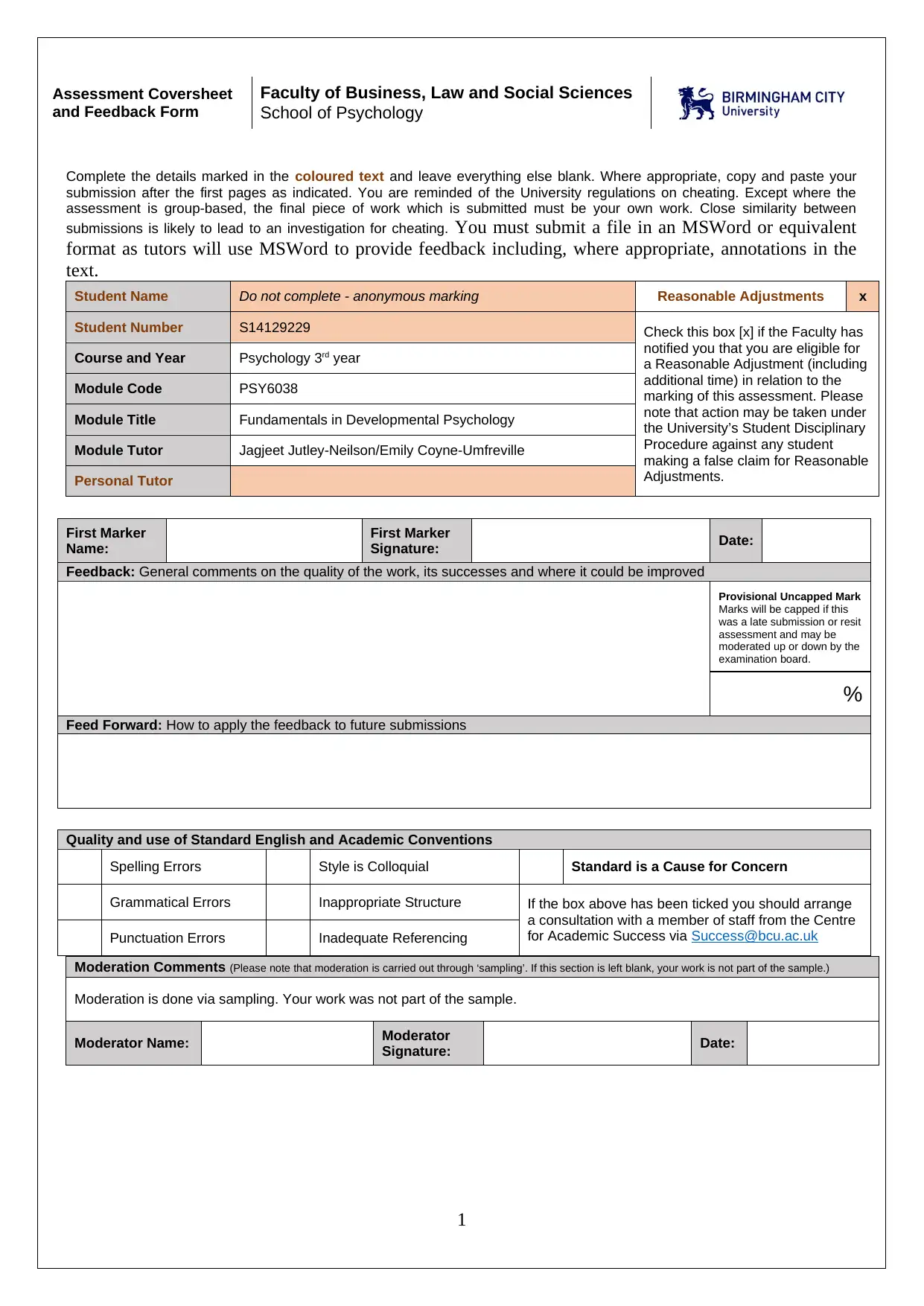
Assessment Coversheet
and Feedback Form
Faculty of Business, Law and Social Sciences
School of Psychology
Complete the details marked in the coloured text and leave everything else blank. Where appropriate, copy and paste your
submission after the first pages as indicated. You are reminded of the University regulations on cheating. Except where the
assessment is group-based, the final piece of work which is submitted must be your own work. Close similarity between
submissions is likely to lead to an investigation for cheating. You must submit a file in an MSWord or equivalent
format as tutors will use MSWord to provide feedback including, where appropriate, annotations in the
text.
Student Name Do not complete - anonymous marking Reasonable Adjustments x
Student Number S14129229 Check this box [x] if the Faculty has
notified you that you are eligible for
a Reasonable Adjustment (including
additional time) in relation to the
marking of this assessment. Please
note that action may be taken under
the University’s Student Disciplinary
Procedure against any student
making a false claim for Reasonable
Adjustments.
Course and Year Psychology 3rd year
Module Code PSY6038
Module Title Fundamentals in Developmental Psychology
Module Tutor Jagjeet Jutley-Neilson/Emily Coyne-Umfreville
Personal Tutor
First Marker
Name:
First Marker
Signature: Date:
Feedback: General comments on the quality of the work, its successes and where it could be improved
Provisional Uncapped Mark
Marks will be capped if this
was a late submission or resit
assessment and may be
moderated up or down by the
examination board.
%
Feed Forward: How to apply the feedback to future submissions
Quality and use of Standard English and Academic Conventions
Spelling Errors Style is Colloquial Standard is a Cause for Concern
Grammatical Errors Inappropriate Structure If the box above has been ticked you should arrange
a consultation with a member of staff from the Centre
for Academic Success via Success@bcu.ac.ukPunctuation Errors Inadequate Referencing
Moderation Comments (Please note that moderation is carried out through ‘sampling’. If this section is left blank, your work is not part of the sample.)
Moderation is done via sampling. Your work was not part of the sample.
Moderator Name: Moderator
Signature: Date:
1
and Feedback Form
Faculty of Business, Law and Social Sciences
School of Psychology
Complete the details marked in the coloured text and leave everything else blank. Where appropriate, copy and paste your
submission after the first pages as indicated. You are reminded of the University regulations on cheating. Except where the
assessment is group-based, the final piece of work which is submitted must be your own work. Close similarity between
submissions is likely to lead to an investigation for cheating. You must submit a file in an MSWord or equivalent
format as tutors will use MSWord to provide feedback including, where appropriate, annotations in the
text.
Student Name Do not complete - anonymous marking Reasonable Adjustments x
Student Number S14129229 Check this box [x] if the Faculty has
notified you that you are eligible for
a Reasonable Adjustment (including
additional time) in relation to the
marking of this assessment. Please
note that action may be taken under
the University’s Student Disciplinary
Procedure against any student
making a false claim for Reasonable
Adjustments.
Course and Year Psychology 3rd year
Module Code PSY6038
Module Title Fundamentals in Developmental Psychology
Module Tutor Jagjeet Jutley-Neilson/Emily Coyne-Umfreville
Personal Tutor
First Marker
Name:
First Marker
Signature: Date:
Feedback: General comments on the quality of the work, its successes and where it could be improved
Provisional Uncapped Mark
Marks will be capped if this
was a late submission or resit
assessment and may be
moderated up or down by the
examination board.
%
Feed Forward: How to apply the feedback to future submissions
Quality and use of Standard English and Academic Conventions
Spelling Errors Style is Colloquial Standard is a Cause for Concern
Grammatical Errors Inappropriate Structure If the box above has been ticked you should arrange
a consultation with a member of staff from the Centre
for Academic Success via Success@bcu.ac.ukPunctuation Errors Inadequate Referencing
Moderation Comments (Please note that moderation is carried out through ‘sampling’. If this section is left blank, your work is not part of the sample.)
Moderation is done via sampling. Your work was not part of the sample.
Moderator Name: Moderator
Signature: Date:
1
Paraphrase This Document
Need a fresh take? Get an instant paraphrase of this document with our AI Paraphraser
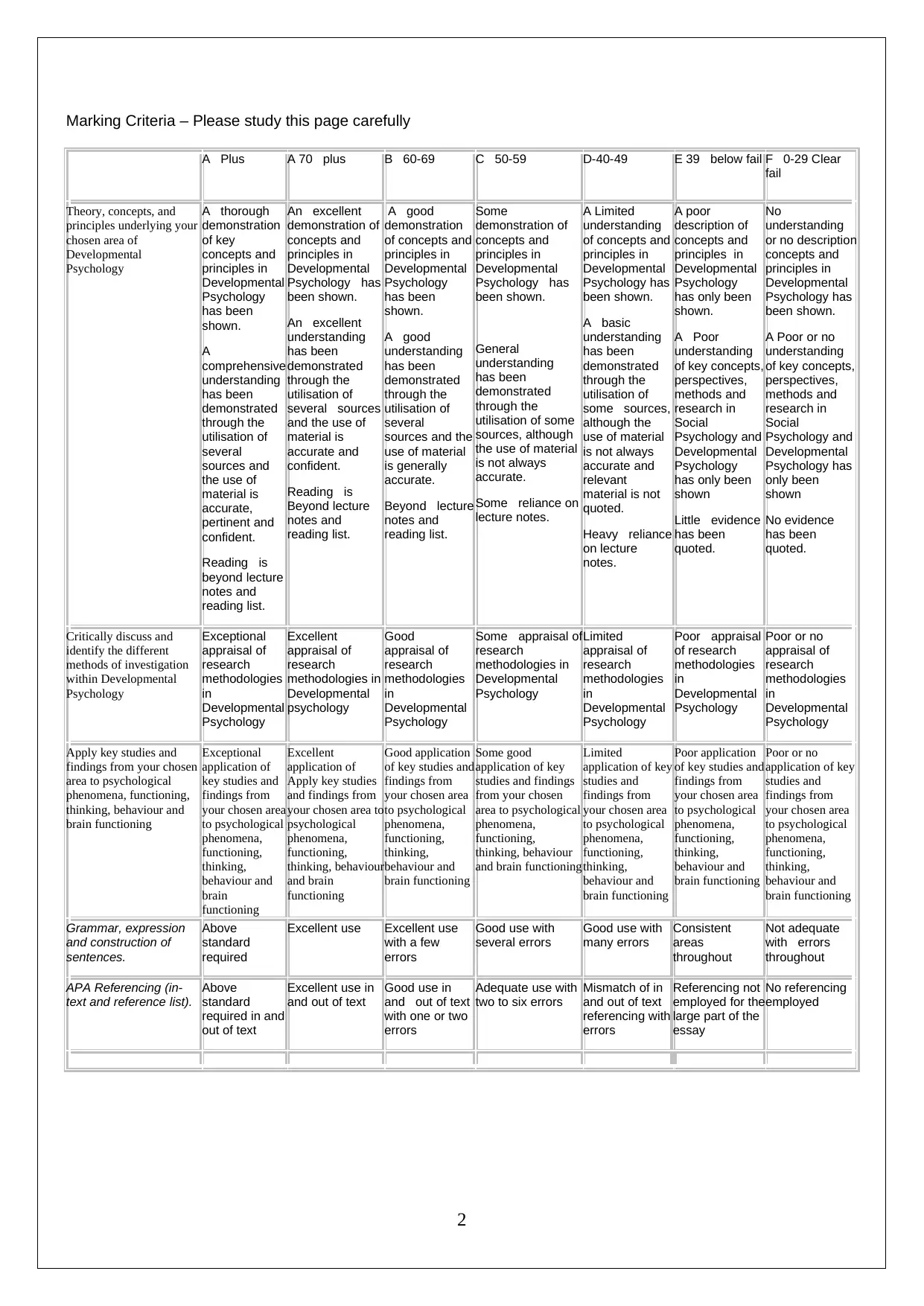
Marking Criteria – Please study this page carefully
A Plus A 70 plus B 60-69 C 50-59 D-40-49 E 39 below fail F 0-29 Clear
fail
Theory, concepts, and
principles underlying your
chosen area of
Developmental
Psychology
A thorough
demonstration
of key
concepts and
principles in
Developmental
Psychology
has been
shown.
A
comprehensive
understanding
has been
demonstrated
through the
utilisation of
several
sources and
the use of
material is
accurate,
pertinent and
confident.
Reading is
beyond lecture
notes and
reading list.
An excellent
demonstration of
concepts and
principles in
Developmental
Psychology has
been shown.
An excellent
understanding
has been
demonstrated
through the
utilisation of
several sources
and the use of
material is
accurate and
confident.
Reading is
Beyond lecture
notes and
reading list.
A good
demonstration
of concepts and
principles in
Developmental
Psychology
has been
shown.
A good
understanding
has been
demonstrated
through the
utilisation of
several
sources and the
use of material
is generally
accurate.
Beyond lecture
notes and
reading list.
Some
demonstration of
concepts and
principles in
Developmental
Psychology has
been shown.
General
understanding
has been
demonstrated
through the
utilisation of some
sources, although
the use of material
is not always
accurate.
Some reliance on
lecture notes.
A Limited
understanding
of concepts and
principles in
Developmental
Psychology has
been shown.
A basic
understanding
has been
demonstrated
through the
utilisation of
some sources,
although the
use of material
is not always
accurate and
relevant
material is not
quoted.
Heavy reliance
on lecture
notes.
A poor
description of
concepts and
principles in
Developmental
Psychology
has only been
shown.
A Poor
understanding
of key concepts,
perspectives,
methods and
research in
Social
Psychology and
Developmental
Psychology
has only been
shown
Little evidence
has been
quoted.
No
understanding
or no description
concepts and
principles in
Developmental
Psychology has
been shown.
A Poor or no
understanding
of key concepts,
perspectives,
methods and
research in
Social
Psychology and
Developmental
Psychology has
only been
shown
No evidence
has been
quoted.
Critically discuss and
identify the different
methods of investigation
within Developmental
Psychology
Exceptional
appraisal of
research
methodologies
in
Developmental
Psychology
Excellent
appraisal of
research
methodologies in
Developmental
psychology
Good
appraisal of
research
methodologies
in
Developmental
Psychology
Some appraisal of
research
methodologies in
Developmental
Psychology
Limited
appraisal of
research
methodologies
in
Developmental
Psychology
Poor appraisal
of research
methodologies
in
Developmental
Psychology
Poor or no
appraisal of
research
methodologies
in
Developmental
Psychology
Apply key studies and
findings from your chosen
area to psychological
phenomena, functioning,
thinking, behaviour and
brain functioning
Exceptional
application of
key studies and
findings from
your chosen area
to psychological
phenomena,
functioning,
thinking,
behaviour and
brain
functioning
Excellent
application of
Apply key studies
and findings from
your chosen area to
psychological
phenomena,
functioning,
thinking, behaviour
and brain
functioning
Good application
of key studies and
findings from
your chosen area
to psychological
phenomena,
functioning,
thinking,
behaviour and
brain functioning
Some good
application of key
studies and findings
from your chosen
area to psychological
phenomena,
functioning,
thinking, behaviour
and brain functioning
Limited
application of key
studies and
findings from
your chosen area
to psychological
phenomena,
functioning,
thinking,
behaviour and
brain functioning
Poor application
of key studies and
findings from
your chosen area
to psychological
phenomena,
functioning,
thinking,
behaviour and
brain functioning
Poor or no
application of key
studies and
findings from
your chosen area
to psychological
phenomena,
functioning,
thinking,
behaviour and
brain functioning
Grammar, expression
and construction of
sentences.
Above
standard
required
Excellent use Excellent use
with a few
errors
Good use with
several errors
Good use with
many errors
Consistent
areas
throughout
Not adequate
with errors
throughout
APA Referencing (in-
text and reference list).
Above
standard
required in and
out of text
Excellent use in
and out of text
Good use in
and out of text
with one or two
errors
Adequate use with
two to six errors
Mismatch of in
and out of text
referencing with
errors
Referencing not
employed for the
large part of the
essay
No referencing
employed
2
A Plus A 70 plus B 60-69 C 50-59 D-40-49 E 39 below fail F 0-29 Clear
fail
Theory, concepts, and
principles underlying your
chosen area of
Developmental
Psychology
A thorough
demonstration
of key
concepts and
principles in
Developmental
Psychology
has been
shown.
A
comprehensive
understanding
has been
demonstrated
through the
utilisation of
several
sources and
the use of
material is
accurate,
pertinent and
confident.
Reading is
beyond lecture
notes and
reading list.
An excellent
demonstration of
concepts and
principles in
Developmental
Psychology has
been shown.
An excellent
understanding
has been
demonstrated
through the
utilisation of
several sources
and the use of
material is
accurate and
confident.
Reading is
Beyond lecture
notes and
reading list.
A good
demonstration
of concepts and
principles in
Developmental
Psychology
has been
shown.
A good
understanding
has been
demonstrated
through the
utilisation of
several
sources and the
use of material
is generally
accurate.
Beyond lecture
notes and
reading list.
Some
demonstration of
concepts and
principles in
Developmental
Psychology has
been shown.
General
understanding
has been
demonstrated
through the
utilisation of some
sources, although
the use of material
is not always
accurate.
Some reliance on
lecture notes.
A Limited
understanding
of concepts and
principles in
Developmental
Psychology has
been shown.
A basic
understanding
has been
demonstrated
through the
utilisation of
some sources,
although the
use of material
is not always
accurate and
relevant
material is not
quoted.
Heavy reliance
on lecture
notes.
A poor
description of
concepts and
principles in
Developmental
Psychology
has only been
shown.
A Poor
understanding
of key concepts,
perspectives,
methods and
research in
Social
Psychology and
Developmental
Psychology
has only been
shown
Little evidence
has been
quoted.
No
understanding
or no description
concepts and
principles in
Developmental
Psychology has
been shown.
A Poor or no
understanding
of key concepts,
perspectives,
methods and
research in
Social
Psychology and
Developmental
Psychology has
only been
shown
No evidence
has been
quoted.
Critically discuss and
identify the different
methods of investigation
within Developmental
Psychology
Exceptional
appraisal of
research
methodologies
in
Developmental
Psychology
Excellent
appraisal of
research
methodologies in
Developmental
psychology
Good
appraisal of
research
methodologies
in
Developmental
Psychology
Some appraisal of
research
methodologies in
Developmental
Psychology
Limited
appraisal of
research
methodologies
in
Developmental
Psychology
Poor appraisal
of research
methodologies
in
Developmental
Psychology
Poor or no
appraisal of
research
methodologies
in
Developmental
Psychology
Apply key studies and
findings from your chosen
area to psychological
phenomena, functioning,
thinking, behaviour and
brain functioning
Exceptional
application of
key studies and
findings from
your chosen area
to psychological
phenomena,
functioning,
thinking,
behaviour and
brain
functioning
Excellent
application of
Apply key studies
and findings from
your chosen area to
psychological
phenomena,
functioning,
thinking, behaviour
and brain
functioning
Good application
of key studies and
findings from
your chosen area
to psychological
phenomena,
functioning,
thinking,
behaviour and
brain functioning
Some good
application of key
studies and findings
from your chosen
area to psychological
phenomena,
functioning,
thinking, behaviour
and brain functioning
Limited
application of key
studies and
findings from
your chosen area
to psychological
phenomena,
functioning,
thinking,
behaviour and
brain functioning
Poor application
of key studies and
findings from
your chosen area
to psychological
phenomena,
functioning,
thinking,
behaviour and
brain functioning
Poor or no
application of key
studies and
findings from
your chosen area
to psychological
phenomena,
functioning,
thinking,
behaviour and
brain functioning
Grammar, expression
and construction of
sentences.
Above
standard
required
Excellent use Excellent use
with a few
errors
Good use with
several errors
Good use with
many errors
Consistent
areas
throughout
Not adequate
with errors
throughout
APA Referencing (in-
text and reference list).
Above
standard
required in and
out of text
Excellent use in
and out of text
Good use in
and out of text
with one or two
errors
Adequate use with
two to six errors
Mismatch of in
and out of text
referencing with
errors
Referencing not
employed for the
large part of the
essay
No referencing
employed
2
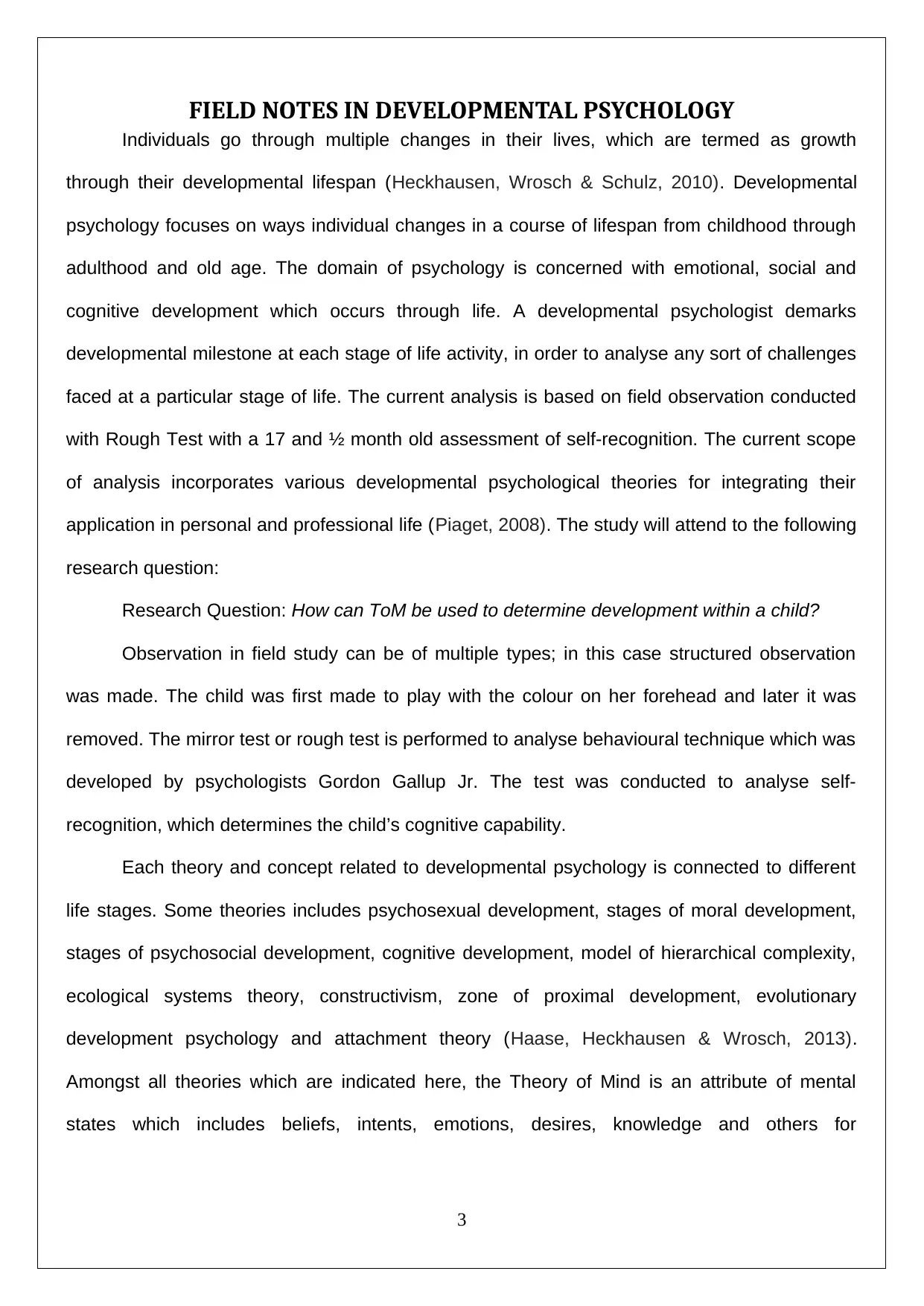
FIELD NOTES IN DEVELOPMENTAL PSYCHOLOGY
Individuals go through multiple changes in their lives, which are termed as growth
through their developmental lifespan (Heckhausen, Wrosch & Schulz, 2010). Developmental
psychology focuses on ways individual changes in a course of lifespan from childhood through
adulthood and old age. The domain of psychology is concerned with emotional, social and
cognitive development which occurs through life. A developmental psychologist demarks
developmental milestone at each stage of life activity, in order to analyse any sort of challenges
faced at a particular stage of life. The current analysis is based on field observation conducted
with Rough Test with a 17 and ½ month old assessment of self-recognition. The current scope
of analysis incorporates various developmental psychological theories for integrating their
application in personal and professional life (Piaget, 2008). The study will attend to the following
research question:
Research Question: How can ToM be used to determine development within a child?
Observation in field study can be of multiple types; in this case structured observation
was made. The child was first made to play with the colour on her forehead and later it was
removed. The mirror test or rough test is performed to analyse behavioural technique which was
developed by psychologists Gordon Gallup Jr. The test was conducted to analyse self-
recognition, which determines the child’s cognitive capability.
Each theory and concept related to developmental psychology is connected to different
life stages. Some theories includes psychosexual development, stages of moral development,
stages of psychosocial development, cognitive development, model of hierarchical complexity,
ecological systems theory, constructivism, zone of proximal development, evolutionary
development psychology and attachment theory (Haase, Heckhausen & Wrosch, 2013).
Amongst all theories which are indicated here, the Theory of Mind is an attribute of mental
states which includes beliefs, intents, emotions, desires, knowledge and others for
3
Individuals go through multiple changes in their lives, which are termed as growth
through their developmental lifespan (Heckhausen, Wrosch & Schulz, 2010). Developmental
psychology focuses on ways individual changes in a course of lifespan from childhood through
adulthood and old age. The domain of psychology is concerned with emotional, social and
cognitive development which occurs through life. A developmental psychologist demarks
developmental milestone at each stage of life activity, in order to analyse any sort of challenges
faced at a particular stage of life. The current analysis is based on field observation conducted
with Rough Test with a 17 and ½ month old assessment of self-recognition. The current scope
of analysis incorporates various developmental psychological theories for integrating their
application in personal and professional life (Piaget, 2008). The study will attend to the following
research question:
Research Question: How can ToM be used to determine development within a child?
Observation in field study can be of multiple types; in this case structured observation
was made. The child was first made to play with the colour on her forehead and later it was
removed. The mirror test or rough test is performed to analyse behavioural technique which was
developed by psychologists Gordon Gallup Jr. The test was conducted to analyse self-
recognition, which determines the child’s cognitive capability.
Each theory and concept related to developmental psychology is connected to different
life stages. Some theories includes psychosexual development, stages of moral development,
stages of psychosocial development, cognitive development, model of hierarchical complexity,
ecological systems theory, constructivism, zone of proximal development, evolutionary
development psychology and attachment theory (Haase, Heckhausen & Wrosch, 2013).
Amongst all theories which are indicated here, the Theory of Mind is an attribute of mental
states which includes beliefs, intents, emotions, desires, knowledge and others for
3
⊘ This is a preview!⊘
Do you want full access?
Subscribe today to unlock all pages.

Trusted by 1+ million students worldwide
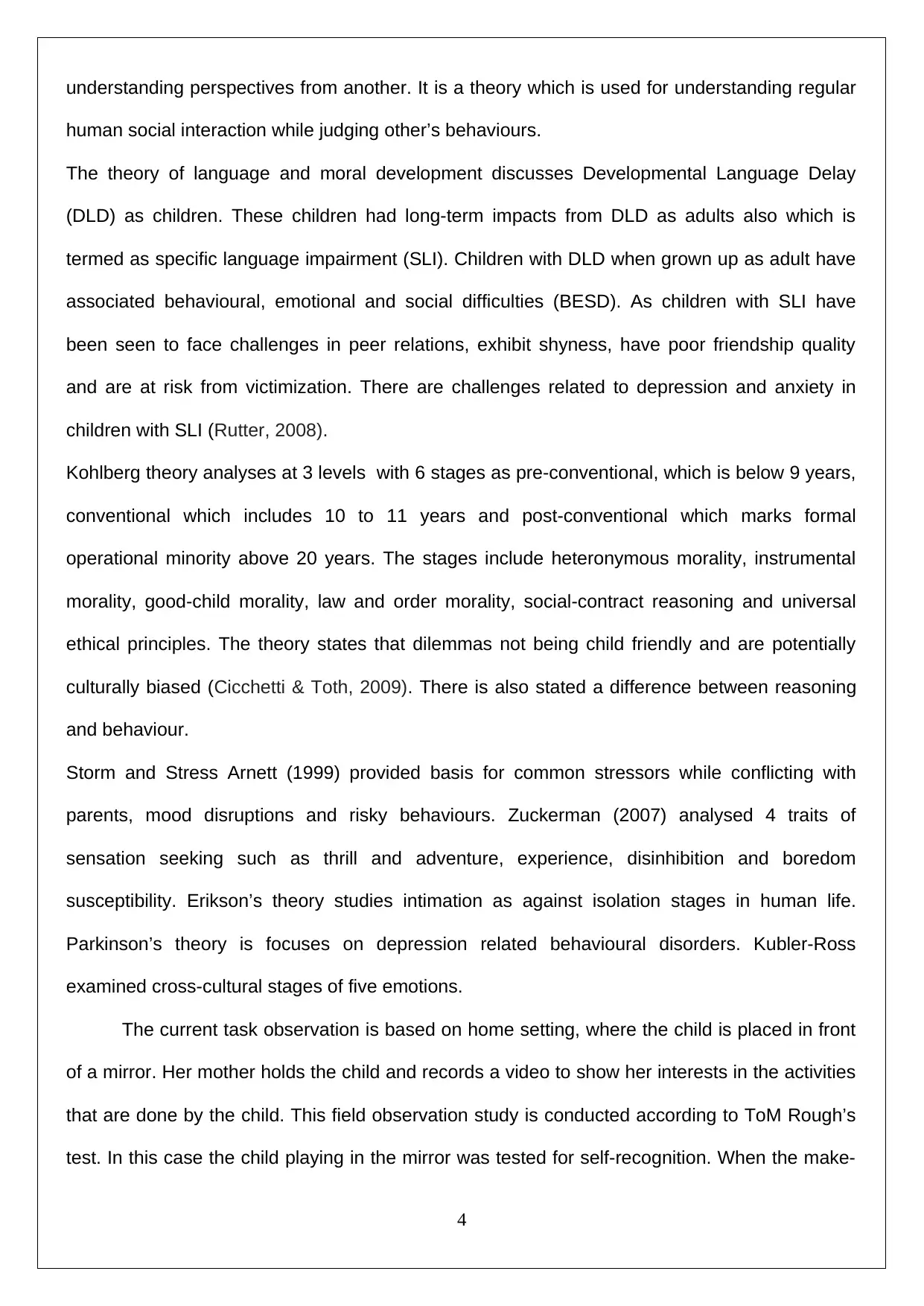
understanding perspectives from another. It is a theory which is used for understanding regular
human social interaction while judging other’s behaviours.
The theory of language and moral development discusses Developmental Language Delay
(DLD) as children. These children had long-term impacts from DLD as adults also which is
termed as specific language impairment (SLI). Children with DLD when grown up as adult have
associated behavioural, emotional and social difficulties (BESD). As children with SLI have
been seen to face challenges in peer relations, exhibit shyness, have poor friendship quality
and are at risk from victimization. There are challenges related to depression and anxiety in
children with SLI (Rutter, 2008).
Kohlberg theory analyses at 3 levels with 6 stages as pre-conventional, which is below 9 years,
conventional which includes 10 to 11 years and post-conventional which marks formal
operational minority above 20 years. The stages include heteronymous morality, instrumental
morality, good-child morality, law and order morality, social-contract reasoning and universal
ethical principles. The theory states that dilemmas not being child friendly and are potentially
culturally biased (Cicchetti & Toth, 2009). There is also stated a difference between reasoning
and behaviour.
Storm and Stress Arnett (1999) provided basis for common stressors while conflicting with
parents, mood disruptions and risky behaviours. Zuckerman (2007) analysed 4 traits of
sensation seeking such as thrill and adventure, experience, disinhibition and boredom
susceptibility. Erikson’s theory studies intimation as against isolation stages in human life.
Parkinson’s theory is focuses on depression related behavioural disorders. Kubler-Ross
examined cross-cultural stages of five emotions.
The current task observation is based on home setting, where the child is placed in front
of a mirror. Her mother holds the child and records a video to show her interests in the activities
that are done by the child. This field observation study is conducted according to ToM Rough’s
test. In this case the child playing in the mirror was tested for self-recognition. When the make-
4
human social interaction while judging other’s behaviours.
The theory of language and moral development discusses Developmental Language Delay
(DLD) as children. These children had long-term impacts from DLD as adults also which is
termed as specific language impairment (SLI). Children with DLD when grown up as adult have
associated behavioural, emotional and social difficulties (BESD). As children with SLI have
been seen to face challenges in peer relations, exhibit shyness, have poor friendship quality
and are at risk from victimization. There are challenges related to depression and anxiety in
children with SLI (Rutter, 2008).
Kohlberg theory analyses at 3 levels with 6 stages as pre-conventional, which is below 9 years,
conventional which includes 10 to 11 years and post-conventional which marks formal
operational minority above 20 years. The stages include heteronymous morality, instrumental
morality, good-child morality, law and order morality, social-contract reasoning and universal
ethical principles. The theory states that dilemmas not being child friendly and are potentially
culturally biased (Cicchetti & Toth, 2009). There is also stated a difference between reasoning
and behaviour.
Storm and Stress Arnett (1999) provided basis for common stressors while conflicting with
parents, mood disruptions and risky behaviours. Zuckerman (2007) analysed 4 traits of
sensation seeking such as thrill and adventure, experience, disinhibition and boredom
susceptibility. Erikson’s theory studies intimation as against isolation stages in human life.
Parkinson’s theory is focuses on depression related behavioural disorders. Kubler-Ross
examined cross-cultural stages of five emotions.
The current task observation is based on home setting, where the child is placed in front
of a mirror. Her mother holds the child and records a video to show her interests in the activities
that are done by the child. This field observation study is conducted according to ToM Rough’s
test. In this case the child playing in the mirror was tested for self-recognition. When the make-
4
Paraphrase This Document
Need a fresh take? Get an instant paraphrase of this document with our AI Paraphraser
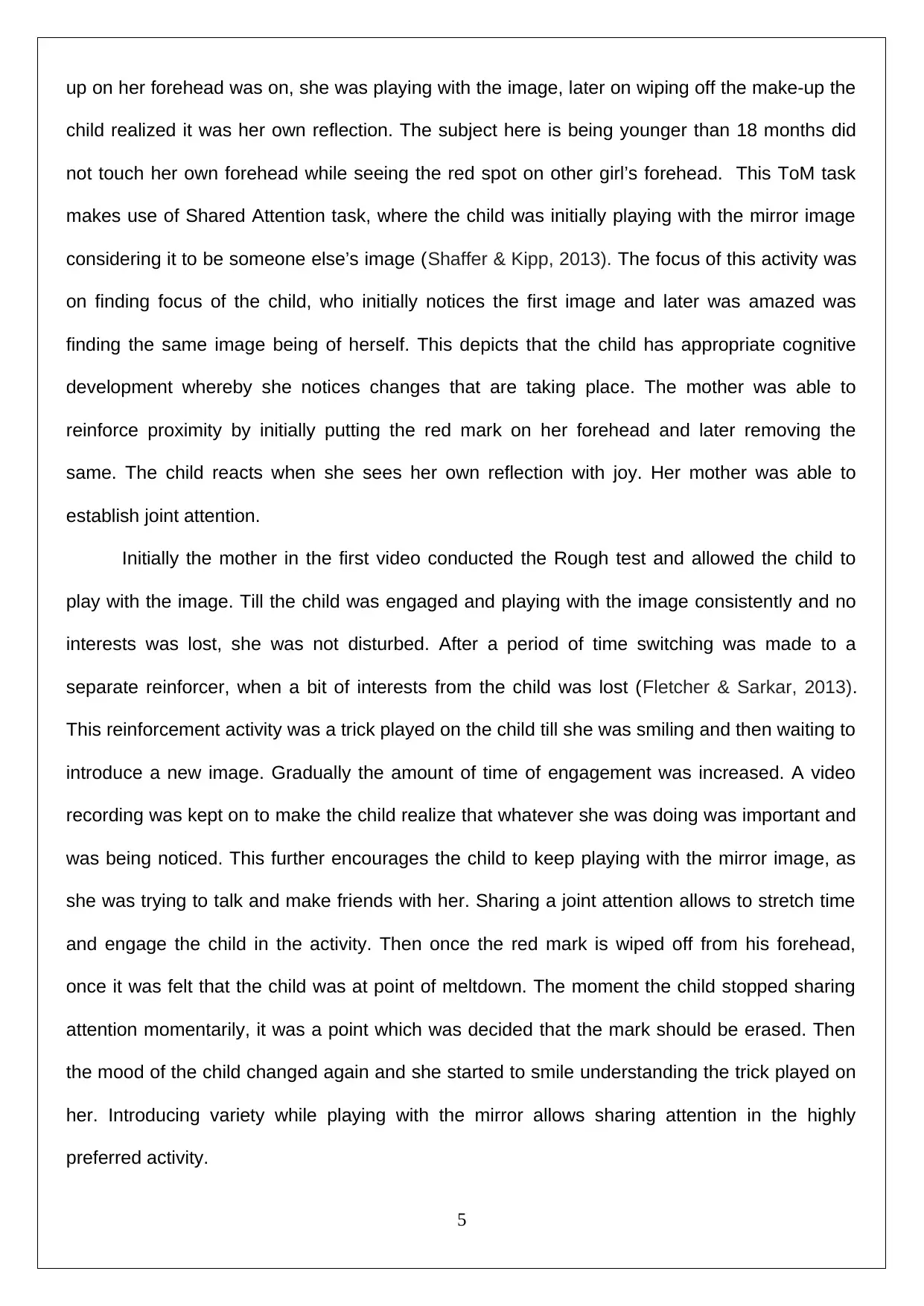
up on her forehead was on, she was playing with the image, later on wiping off the make-up the
child realized it was her own reflection. The subject here is being younger than 18 months did
not touch her own forehead while seeing the red spot on other girl’s forehead. This ToM task
makes use of Shared Attention task, where the child was initially playing with the mirror image
considering it to be someone else’s image (Shaffer & Kipp, 2013). The focus of this activity was
on finding focus of the child, who initially notices the first image and later was amazed was
finding the same image being of herself. This depicts that the child has appropriate cognitive
development whereby she notices changes that are taking place. The mother was able to
reinforce proximity by initially putting the red mark on her forehead and later removing the
same. The child reacts when she sees her own reflection with joy. Her mother was able to
establish joint attention.
Initially the mother in the first video conducted the Rough test and allowed the child to
play with the image. Till the child was engaged and playing with the image consistently and no
interests was lost, she was not disturbed. After a period of time switching was made to a
separate reinforcer, when a bit of interests from the child was lost (Fletcher & Sarkar, 2013).
This reinforcement activity was a trick played on the child till she was smiling and then waiting to
introduce a new image. Gradually the amount of time of engagement was increased. A video
recording was kept on to make the child realize that whatever she was doing was important and
was being noticed. This further encourages the child to keep playing with the mirror image, as
she was trying to talk and make friends with her. Sharing a joint attention allows to stretch time
and engage the child in the activity. Then once the red mark is wiped off from his forehead,
once it was felt that the child was at point of meltdown. The moment the child stopped sharing
attention momentarily, it was a point which was decided that the mark should be erased. Then
the mood of the child changed again and she started to smile understanding the trick played on
her. Introducing variety while playing with the mirror allows sharing attention in the highly
preferred activity.
5
child realized it was her own reflection. The subject here is being younger than 18 months did
not touch her own forehead while seeing the red spot on other girl’s forehead. This ToM task
makes use of Shared Attention task, where the child was initially playing with the mirror image
considering it to be someone else’s image (Shaffer & Kipp, 2013). The focus of this activity was
on finding focus of the child, who initially notices the first image and later was amazed was
finding the same image being of herself. This depicts that the child has appropriate cognitive
development whereby she notices changes that are taking place. The mother was able to
reinforce proximity by initially putting the red mark on her forehead and later removing the
same. The child reacts when she sees her own reflection with joy. Her mother was able to
establish joint attention.
Initially the mother in the first video conducted the Rough test and allowed the child to
play with the image. Till the child was engaged and playing with the image consistently and no
interests was lost, she was not disturbed. After a period of time switching was made to a
separate reinforcer, when a bit of interests from the child was lost (Fletcher & Sarkar, 2013).
This reinforcement activity was a trick played on the child till she was smiling and then waiting to
introduce a new image. Gradually the amount of time of engagement was increased. A video
recording was kept on to make the child realize that whatever she was doing was important and
was being noticed. This further encourages the child to keep playing with the mirror image, as
she was trying to talk and make friends with her. Sharing a joint attention allows to stretch time
and engage the child in the activity. Then once the red mark is wiped off from his forehead,
once it was felt that the child was at point of meltdown. The moment the child stopped sharing
attention momentarily, it was a point which was decided that the mark should be erased. Then
the mood of the child changed again and she started to smile understanding the trick played on
her. Introducing variety while playing with the mirror allows sharing attention in the highly
preferred activity.
5
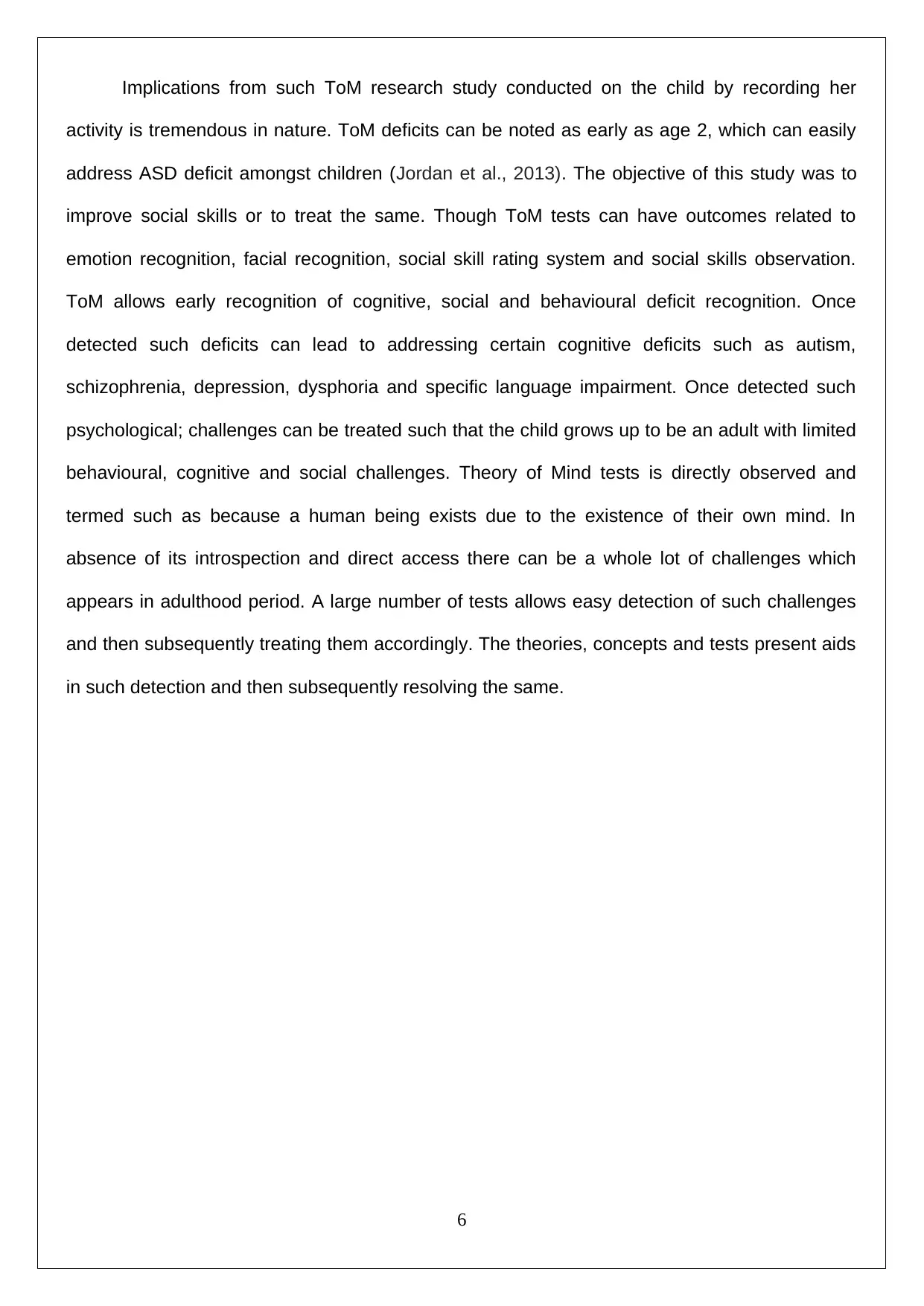
Implications from such ToM research study conducted on the child by recording her
activity is tremendous in nature. ToM deficits can be noted as early as age 2, which can easily
address ASD deficit amongst children (Jordan et al., 2013). The objective of this study was to
improve social skills or to treat the same. Though ToM tests can have outcomes related to
emotion recognition, facial recognition, social skill rating system and social skills observation.
ToM allows early recognition of cognitive, social and behavioural deficit recognition. Once
detected such deficits can lead to addressing certain cognitive deficits such as autism,
schizophrenia, depression, dysphoria and specific language impairment. Once detected such
psychological; challenges can be treated such that the child grows up to be an adult with limited
behavioural, cognitive and social challenges. Theory of Mind tests is directly observed and
termed such as because a human being exists due to the existence of their own mind. In
absence of its introspection and direct access there can be a whole lot of challenges which
appears in adulthood period. A large number of tests allows easy detection of such challenges
and then subsequently treating them accordingly. The theories, concepts and tests present aids
in such detection and then subsequently resolving the same.
6
activity is tremendous in nature. ToM deficits can be noted as early as age 2, which can easily
address ASD deficit amongst children (Jordan et al., 2013). The objective of this study was to
improve social skills or to treat the same. Though ToM tests can have outcomes related to
emotion recognition, facial recognition, social skill rating system and social skills observation.
ToM allows early recognition of cognitive, social and behavioural deficit recognition. Once
detected such deficits can lead to addressing certain cognitive deficits such as autism,
schizophrenia, depression, dysphoria and specific language impairment. Once detected such
psychological; challenges can be treated such that the child grows up to be an adult with limited
behavioural, cognitive and social challenges. Theory of Mind tests is directly observed and
termed such as because a human being exists due to the existence of their own mind. In
absence of its introspection and direct access there can be a whole lot of challenges which
appears in adulthood period. A large number of tests allows easy detection of such challenges
and then subsequently treating them accordingly. The theories, concepts and tests present aids
in such detection and then subsequently resolving the same.
6
⊘ This is a preview!⊘
Do you want full access?
Subscribe today to unlock all pages.

Trusted by 1+ million students worldwide
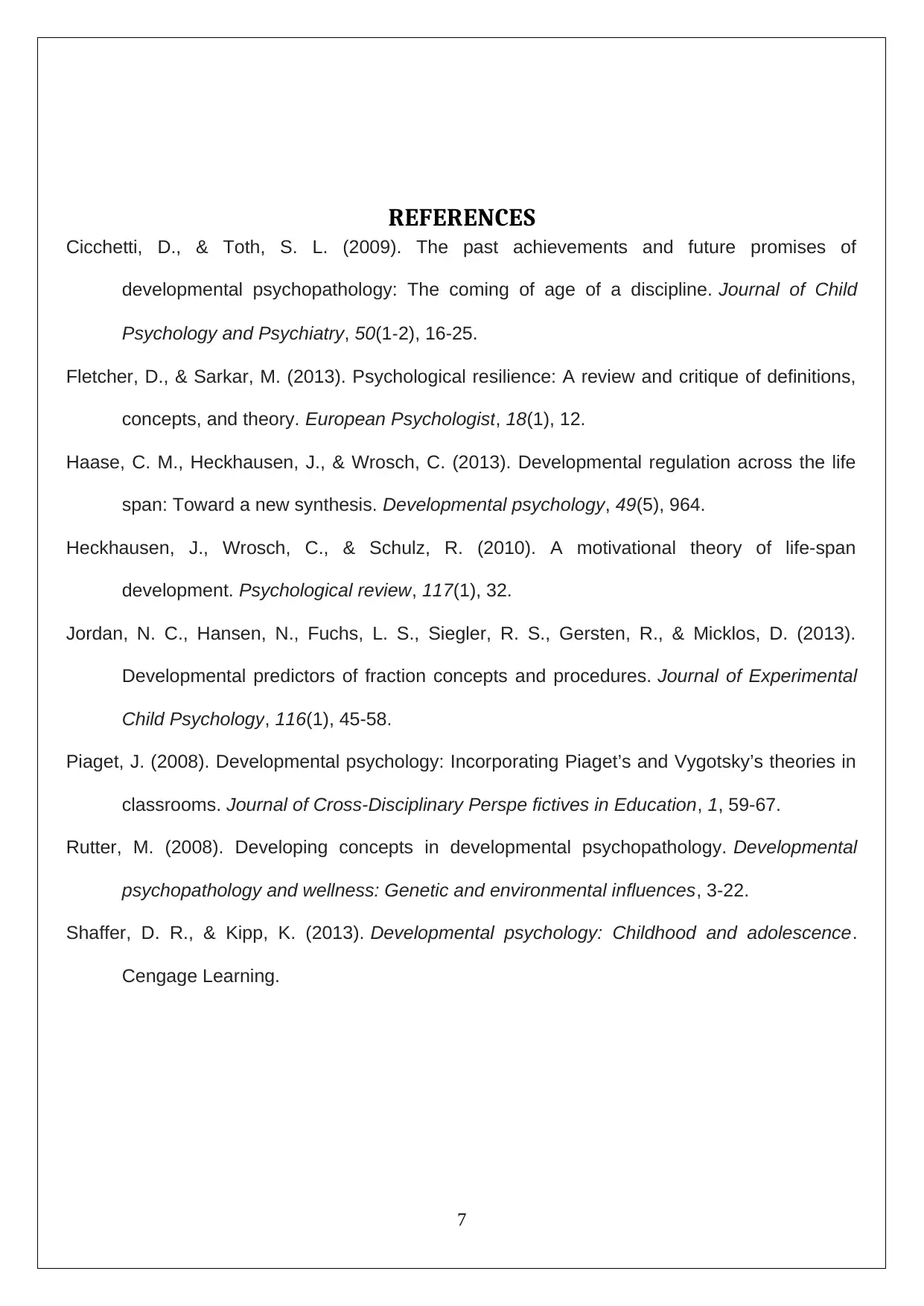
REFERENCES
Cicchetti, D., & Toth, S. L. (2009). The past achievements and future promises of
developmental psychopathology: The coming of age of a discipline. Journal of Child
Psychology and Psychiatry, 50(1‐2), 16-25.
Fletcher, D., & Sarkar, M. (2013). Psychological resilience: A review and critique of definitions,
concepts, and theory. European Psychologist, 18(1), 12.
Haase, C. M., Heckhausen, J., & Wrosch, C. (2013). Developmental regulation across the life
span: Toward a new synthesis. Developmental psychology, 49(5), 964.
Heckhausen, J., Wrosch, C., & Schulz, R. (2010). A motivational theory of life-span
development. Psychological review, 117(1), 32.
Jordan, N. C., Hansen, N., Fuchs, L. S., Siegler, R. S., Gersten, R., & Micklos, D. (2013).
Developmental predictors of fraction concepts and procedures. Journal of Experimental
Child Psychology, 116(1), 45-58.
Piaget, J. (2008). Developmental psychology: Incorporating Piaget’s and Vygotsky’s theories in
classrooms. Journal of Cross-Disciplinary Perspe fictives in Education, 1, 59-67.
Rutter, M. (2008). Developing concepts in developmental psychopathology. Developmental
psychopathology and wellness: Genetic and environmental influences, 3-22.
Shaffer, D. R., & Kipp, K. (2013). Developmental psychology: Childhood and adolescence.
Cengage Learning.
7
Cicchetti, D., & Toth, S. L. (2009). The past achievements and future promises of
developmental psychopathology: The coming of age of a discipline. Journal of Child
Psychology and Psychiatry, 50(1‐2), 16-25.
Fletcher, D., & Sarkar, M. (2013). Psychological resilience: A review and critique of definitions,
concepts, and theory. European Psychologist, 18(1), 12.
Haase, C. M., Heckhausen, J., & Wrosch, C. (2013). Developmental regulation across the life
span: Toward a new synthesis. Developmental psychology, 49(5), 964.
Heckhausen, J., Wrosch, C., & Schulz, R. (2010). A motivational theory of life-span
development. Psychological review, 117(1), 32.
Jordan, N. C., Hansen, N., Fuchs, L. S., Siegler, R. S., Gersten, R., & Micklos, D. (2013).
Developmental predictors of fraction concepts and procedures. Journal of Experimental
Child Psychology, 116(1), 45-58.
Piaget, J. (2008). Developmental psychology: Incorporating Piaget’s and Vygotsky’s theories in
classrooms. Journal of Cross-Disciplinary Perspe fictives in Education, 1, 59-67.
Rutter, M. (2008). Developing concepts in developmental psychopathology. Developmental
psychopathology and wellness: Genetic and environmental influences, 3-22.
Shaffer, D. R., & Kipp, K. (2013). Developmental psychology: Childhood and adolescence.
Cengage Learning.
7
1 out of 7
Related Documents
Your All-in-One AI-Powered Toolkit for Academic Success.
+13062052269
info@desklib.com
Available 24*7 on WhatsApp / Email
![[object Object]](/_next/static/media/star-bottom.7253800d.svg)
Unlock your academic potential
Copyright © 2020–2026 A2Z Services. All Rights Reserved. Developed and managed by ZUCOL.





